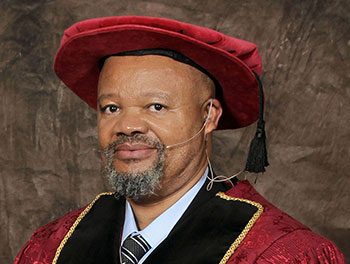Professor Mandla S Makhanya
The history of humankind is replete with many examples of natural and man-made calamities that have caused human beings to re-examine and re-engineer their way of doing things – be it in business, health, social relations and even in education. However, none can come closer to the effect that the novel Coronavirus, otherwise known as Covid-19, has had on people across the globe; particularly the manner in which it has influenced the urgency and the speed with which we have been compelled to embrace and actualize the Fourth Industrial Revolution (4IR).
Granted, the entire world – and indeed our own country – had already been grappling with the introduction of the fourth industrial revolution in the broader spheres of society, including in the business and education sectors before Covid-19 was unexpectedly unleashed onto an unsuspecting and less-than-ready world.
In the higher education sector in particular, the advent of the Coronavirus and the resultant interventions by the state to curb the spread of the virus to unmanageable proportions, especially with regard to the restriction of movement and physical distancing, has necessitated both the introduction and expeditious roll-out of online methods of teaching, learning, student support and assessment.
Many institutions of higher learning, from universities to TVET colleges, are now confronted with the challenge of having to make online teaching and learning a reality; and do so within the shortest time possible in order to save the 2020 academic year.
Many of these institutions have never played in this space before; whilst many others simply do not have the wherewithal or requisite financial muscles to deal with so huge a challenge. But, daunting as this task may be, it is one that we all have no choice but to confront.
The state has made the task even lighter by making a provision in the budget to enable institutions of higher learning, across the board, to enter this space and empower their students to learn and succeed during these trying times.
This task is, of course, not one that can be tackled piecemeal and by any one institution alone.
It requires a joint, concerted and unified approach that will yield the best result possible. The Minister of Higher Education, Science and Technology, the Honourable Dr Blade Nzimande, rightly stated at a press conference recently that institutions that have experience in the field of open distance and e-learning, such as the University of South Africa, can play a pivotal role in the space and share expertise, experiences and do’s-and-don’ts with those who are new in the field.
I can say without any fear of contradiction that Unisa is more prepared and willing to step into the fray and impart its knowledge and skill in the field, gained over more than 145 years in distance education in general; and e-learning in the last decade in particular.
If anything, there is a general consensus in our institution that this is a national duty for the good of the country as a whole.
Equally, whilst we are the only dedicated open distance and e-learning provider in the country, a few other institutions were allowed to enter the space of distance and e-learning in the last couple of years; and have amassed sufficient knowledge and expertise that can benefit the new entrants in the space.
This task is, without a shadow of doubt, mammoth – but not insurmountable. Together we will have to face the complexities of this environment, involving amongst others access to on-line learning material, the provision of on-line student support, on-line receiving and marking of assignments and on-line methods of student assessment.
The broader higher education sector leadership, from the respective education ministries and departments to university and TVET leadership, is alive to the socio-economic realities of our country in as far as access to technology is concerned.
For some it is a matter of affordability and for others the non-availability of the requisite band-width in their residential areas.
Still others merely suffer from a simple case of techno-phobia, notwithstanding their access to financial resources and band-width.
Together as a society, we should accept the reality that, post Covid-19, we cannot return to doing things the old way; and that the on-line way of doings things generally is the reality of our time.
Indeed, it will not be easy, but I am convinced that our full entry into the digital space has now become an unstoppable juggernaut. Ours is to embrace the fourth industrial revolution fully and proceed full speed.
ABOU THE AUTHOR|
Professor Mandla Makhanya is the Principal and Vice Chancellor of Unisa






